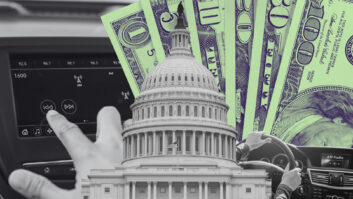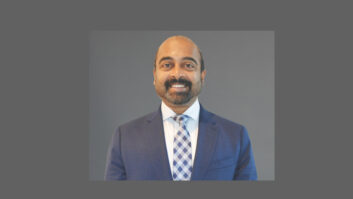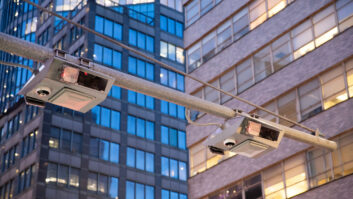The author is president emeritus and senior adviser of the Multicultural Media, Telecom and Internet Council.
MMTC’s 30 years have been wrapped up in AM radio. As the heritage communications technology for minorities, AM has been the voice of the voiceless, the training ground for the underserved and the place to get on the air if most of your audience isn’t fluent in English.
As a nonprofit, MMTC has had 10 AM stations donated to us. We’ve used them to train new entrants to become owners programming black gospel, Spanish and Hmong.
MMTC recently published a series of recommendations for the next FCC, including a recommendation to create an AM Glidepath. Some people thought this meant that MMTC wants to decommission the AM band. That’s not the case at all. Radio World invited us to explain not only our recommendation but the history of MMTC’s journey around the AM band.

Those of us who love AM do not want it be “decommissioned,” as a couple of recent headlines inaccurately suggested.
Credit: iStockphoto/bayhayalet
WORTH SAVING
In 1979, I was part of the State Department’s World Administrative Radio Conference delegation in Geneva, where I helped negotiate the Western Hemisphere’s new AM treaty arrangements. That got me hooked on AM.
When MMTC founded our media brokerage in 1997, we began specializing in AM transactions. Over the years helping buyers and sellers, I rode shotgun with lots of engineers visiting failing AM stations, and it was heartbreaking. These weren’t the 50 kW clear channel blowtorches whose audiences rivaled the 100 kW monster FMs. Those heritage AM market dominators will do quite well — even without the millennials who shun AM, even without the mobile devices that don’t carry AM.
The AMs I got to visit and to sell, sometimes for a few thousand dollars, were the “sad sacks” of the AM band: small-market daytimers with aging audio chains, temperamental transmitters, audiences older than me (and Truman was president when I was born), negative cash flow, zero audience ratings book after book, huge sums invested but no buyers except at token prices that would be insulting if they weren’t real.
Getting to know these AM pioneers — moms and pops who were giving their lives to their communities using this quirky 107-year-old technology — convinced me that the Federal Communications Commission needed to take dramatic steps to save the band.
“But AM is just a bunch of anti-civil rights right-wingers,” more than one friend told me. “Let it go.”
My answer to this was “So?” The bulk of minority communications investment was and is on AM. The vast majority of multilingual radio service is on AM. I’m not going to let these folk down just because someone else benefits too.
Besides, I’d be a hypocrite if I didn’t fess up to having been a conservative talk impresario for a while. Here’s how that happened:
A few years ago, someone with a sense of humor donated the Multicultural Media, Telecom and Internet Council a right-wing conservative talk AM station. It featured “The Blaze” and came with a first-rate audio chain.
I studied the market — and what do you know, the format hole was indeed conservative talk. The audience liked the programming, which included some nonpartisan, informative, non-ideological local talk.
MMTC — a nonpartisan civil rights organization — feels strongly that minorities need to become qualified to work in every radio format. So we kept the format and we used the station to train minorities in conservative talk. We actually ran Glenn Beck in afternoon drive, because he belonged there.
Yeah, I usually disagreed with what he had to say. And I could have hit the “kill switch” at any time, but I never did. I felt that our audience in Augusta, Ga., had a better handle on what they should be hearing than I did in Washington, D.C. Besides, I always wondered how Mr. Beck felt about being carried on an affiliate owned by a mainstream civil rights organization. Maybe it calmed him down a bit.
So that’s the story of MMTC’s journey into AM. That explains why we set out to do everything we could do to extend the life of the band.
We knew that AM, like a shopping mall, could collapse entirely if the anchor stores failed. So we sought solutions for the entire band, not just for the small failing stations.
RESCUE PLANS A AND B
In 2010, our “Radio Rescue Committee” had a Plan A and a Plan B.
Our Plan A was to join forces with the Broadcast Maximization Committee and ask the FCC to allow AM to migrate to TV Channels 5–6, where the stations would become frequency modulated and triple in value.
That wasn’t in the cards. The FCC wanted those channels for the DTV incentive auction.
But thanks to the initiative of Commissioners Ajit Pai and Mignon Clyburn, and the advocacy support of the National Association of Black Owned Broadcasters and National Association of Broadcasters, we got our Plan B: AM-only translator windows that are saving a boatload of AM stations from economic oblivion.
The FCC still can do more to extend the life of AM. We’ve asked the commission to deregulate outdated rules on minimum staffing, nighttime interference and some of the public file rules that predated the digital age.
And for our part, we can lengthen AM’s life by continuing to tell radio’s story with enthusiasm and verve. It’s OK to “accentuate the positive.”
Advertisers certainly need to understand that those of us who love AM do not want it be “decommissioned,” as a couple of recent headlines inaccurately suggested.
Instead, what we want for AM, and for AM pioneers, is the same thing we want for our parents and spouses: a good life insurance policy.
INSURANCE PLAN
Having life insurance doesn’t mean we want our loved ones to die. What it means is that we don’t want our loved ones’ families to suffer if/when those loved ones do die.
Why does AM need life insurance? Is it in danger?
Let’s be really honest, folks. In the short run, no. But in the long run, maybe. Someday — perhaps as soon as 30 years from now — AM may be doomed to go the way of the telegraph service, whether we like it or not. And we won’t like it.
We certainly are not asking the FCC to hasten that event. Instead, we want the commission to do everything it can to avoid or postpone it.
The nightmare we need to avoid is the nightmare families face when they didn’t arrange for life insurance: The AM band becomes unsustainable, and AM pioneers, who’ve struggled to serve the most underserved communities, get told “Sorry, you are out of luck — thank you for your service to your country. Now go away.” That would be morally wrong, and we cannot allow it to happen.
What would be a good life insurance policy for the AM band?
There are two key elements.
First, we want the FCC to start a process that could lead to lengthening the life of the band by compensating licensees at fair value in exchange for surrendering their licenses, and enabling AM broadcasters to transition their programming to other platforms. The FCC could do that by starting now toward planning for the compression of the band from its present 535–1705 kHz to (for example) 535–1005 kHz, and going from 10 kHz spacing to 20 kHz spacing. Such a band would accommodate fewer stations, but the stations would be much more competitive and they — and the AM band — would have a fighting chance at surviving decades longer.
Second, we want the FCC to think three or four decades ahead, toward the inevitable day when AM might no longer be sustainable. If that happens, what other communications services could use AM spectrum? Could it be used for meter reading? The Internet of Things? Drones? The FCC is not known for expedited action, so it ought to start early by convening the best engineering minds to think about these questions. In this way, the federal government could be in a position to offer AM owners fair value for their assets, rather than just letting their companies die if the band dies.
Now, we’re not sure what the correct parameters are for this kind of plan.
Should the band be compressed? How far? If stations want to continue to operate, but on lower frequencies, who will pay for their relocation? Should we go to wider spacing and perhaps higher power?
How much skywave protection will we need; can we convert day-timers into full-timers someday in much of the country? Should we go back to the 100 kW “flamethrower” era when two massive signals cover the nation for public safety purposes?
If licensees want to cash out, will the federal government buy their spectrum and redeploy it for such uses as air navigation, sonar, Internet of Things, drones, meter reading, crop irrigation or uses not yet contemplated — and who will pay for this, and over how many years will it be paid for? Finally, where will AM programming go to find a new home, so the public doesn’t lose a valuable service?
This is a good time for our AM Glidepath Taskforce to be asking these kinds of questions.
As of early January, it appears likely that Commissioner Ajit Pai will become acting (and possibly permanent) FCC chair. Not since former Broadcast Bureau Chief Ken Cox was a commissioner in the 1960s and 1970s and Jim Quello served in the ’80s and ’90s has there been a greater supporter of AM radio on the 8th floor of the FCC. Commissioner Pai loves and understands radio. When we share with him how the FCC has undervalued and ignored radio in preference to newer “shiny things” in the so-called broadband era, he gets that.
To summarize: We don’t want AM radio to be decommissioned. We would dearly love to see AM expand and thrive. What we’re hoping the FCC will do is give struggling AM owners an insurance policy: the voluntary option, in a few decades, of exiting honorably and with compensation at full value, rather than being forced out against their will if the band crashes 30 years from now due to FCC neglect or inevitable market conditions attendant to new technology.
We need help figuring out the answers, and we sincerely want and need the support of all who love and support AM radio. Please email us with your thoughts, criticisms, ideas and prayers at [email protected].
Comment on this or any story. Email[email protected]with “Letter to the Editor” in the subject field.












